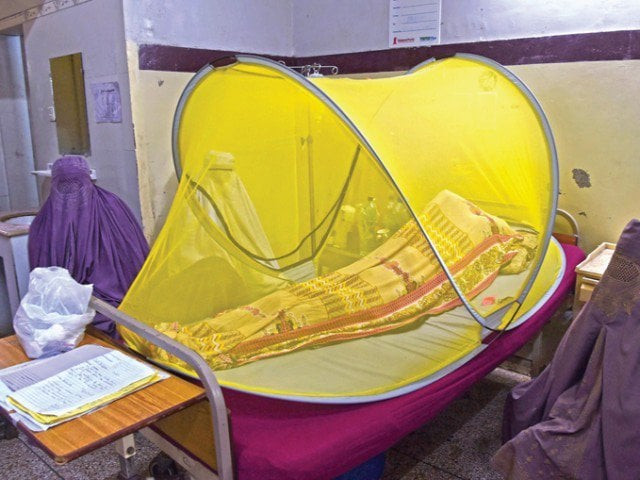Toll from dengue virus outbreak rises to 50 in K-P
Provincial govt embarks on six-month plan to counter virus, control vector-borne diseases

Provincial govt embarks on six-month plan to counter virus, control vector-borne diseases. PHOTO: EXPRESS
Health officials, privy to the developments, stated that with the mercury expected to drop in the coming weeks, the viral infection will automatically ebb.
However, the department is concerned about infections reemerging in February next year. “This is one of the major reasons why the department went for it [the plan] so that the viral infection could be controlled ahead of any other outbreak next year,” a senior health official told The Express Tribune while requesting not to be named since he was not entitled to speak to media. A copy of the plan, available with The Express Tribune, states the department will seek to strengthen the provincial as well as district-level dengue response to collect data from district headquarters hospitals and Medical Teaching Institutions apart from gathering details on vector breeding sites.
This data will then be shared with the provincial Dengue Response Unit (DRU) for coordinated action. The reports stated that dengue [information] desks will be set up at all health facilities to screen suspected patients, apart from designing and implementing of triage during an outbreak. “Implementation in line with the guidelines issued by the World Health Organisation (WHO) for admission, laboratory, discharge and in-patient management monitoring criteria besides establishment of isolation wards and designated healthcare staff round the clock,” the documents explain.
To strengthen the tools available to them, the department wants the provincial government to devise legislation for vector control which, concerned officials say, will help enforcement of municipal laws in urban areas for the proper disposal of household garbage and used tyres. “Establishment and operationalisation of the Provincial Technical Advisory Group (PTAG) to provide technical assistance to provincial DRU,” it read, adding that the establishment of a surveillance system under the umbrella of an integrated disease surveillance and response with the provision of dedicated staff and resources was also planned.
Moreover, the department plans to prioritise vector surveillance in order to control the vector. Further, it will train entomologists and concerned department staff - as identified by the district DRU - on vector surveillance. It will also establish a provincial laboratory for specimen analysis. “Spot mapping, including geographic information system for surveillance, is also on the cards apart from geo-mapping of cases, clustering, reporting health facilities, laboratories and breeding sites,” it read adding that the programme will try to minimise vector breeding sites identified by vector surveillance by covering domestic water storage containers, cleaning of flowerpots and water pots for birds and poultry, cleaning of incidental water collections (water-coolers, pans under refrigerators and air conditioners), managing water storage facilities at construction sites.
Apart from these measures, the department has planned chemical and space spraying at specific sites based on vector surveillance reports in accordance with WHO guidelines over the next six months. Additionally, the department is planning weekly school activities targeting children and their parents to get them involved in eliminating vector breeding sites at home and schools. The health department also wants to collaborate with health and non-health sectors (in both the government and private sectors), non-governmental organisations (NGOs) and local communities through intersectoral coordination for repairing leakages to prevent water pooling, restoration of taps and mosquito proofing of water reservoirs.
This includes the provision of data and information to health department regarding habitats in or around cities at high risk of dengue, determination of the beneficial and adverse impacts of chemical and environmental control measures besides involvement of mosques under the control of the Auqaf department in the anti-dengue drive. It also plans to focus on improving drainage, sewerage systems, safe disposal of solid waste, used containers and mosquito proofing of water storage facilities besides NGOs to implement programmes focusing on health education, source reduction and improvement of housing related to vector control.
Published in The Express Tribune, October 9th, 2017.



















COMMENTS
Comments are moderated and generally will be posted if they are on-topic and not abusive.
For more information, please see our Comments FAQ